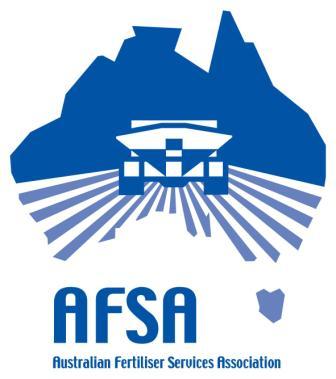AFSA History
Around 1963 a group of Super Spreading Contractors got together to discuss their objectives and how to go about achieving them; this was extremely important as, at this time, superphosphate commenced being supplied and delivered in bulk to regional areas which created many issues. These informal meetings were beneficial in solving the handling issues and in improving equipment. As others became aware of their existence the number at meetings increased. Informal state meetings in South Australia, Victoria and New South Wales followed over the next few years.
The life of a Super Spreader Contractor and Bulk Super Depot Operator was a fairly lonely existence as these people usually worked in isolation and did not have a lot in common with other businesses in their areas. When these people realised that there were others in a similar position to themselves, with similar goals and problems, willing and available to talk, it helped lessen the isolation. It also provided great satisfaction because people were able to help others while picking up information for themselves and their businesses.
The aims were to provide a professional service to farmers, based on good equipment, efficiency, accuracy and reliability. The service provided then, was, and still is today, the key to success.
South Australian Superphosphate Spreaders Group held a meeting on June 20th 1968 with 50 Contractors in attendance. At this meeting it was decided to establish an organisation with the object of promoting and fostering within the state, those engaged in the spreading of super. On September 10th 1970 the third Annual General Meeting was held and a motion was supported by all that the Group support the formation of a National Association with potential branches in New South Wales, Tasmania, South Australia, and Victoria.
The Tasmanian Fertiliser Services Association held its formation meeting on June 24th 1971 with nine contractors present. It was agreed to hold regular meetings during the next twelve months, discussion items being: E.Z Fertilizers, Tasmania Railways and contacting contractors to encourage them to join. The Inaugural Annual General Meeting was held on June 23rd 1972.
The Victorian Fertiliser Services Association held its Inaugural meeting on December 13th 1972. There were forty two contractors in attendance and all supported the formation of a State Branch of a National Association. It was also agreed to assist in organising the 1973 National Conference in Swan Hill.
New South Wales contractors held regional meetings during June and July in 1974 in an attempt to organise a Branch of the Australian Fertiliser Services Association. The meetings were all well attended and the outcome was formation of a Branch of the National Association.
West Australian contractors were meeting on an annual basis with the Bulk Fertiliser Services Association. This group was formed by fertiliser manufacturer CSBP Limited to assist them in having regular dialogue with regional depot operators and Western Australia Railways. The outcomes of these meetings were extremely beneficial to all who attended. In 1994 a West Australian Branch of the National Association was formed.
The Australian Fertiliser Services Association Inaugural National Conference was held on August 15th– 17th 1973. There were 130 delegates in attendance from New South Wales, South Australia, Tasmania and Victoria. The Inaugural Annual General Meeting was held during the conference, the chairman being Laurie Hood from Mount Gambier.
The main objectives of this very new National Association in 1973 were very similar to the main objectives of today. The Association is a group of dedicated members who manufacture, distribute, sell, store, transport, spread or give advice on fertiliser or soil ameliorant products. The association provides its Members with an opportunity to meet and co-operate with other members to improve the services and products provided to clients through Annual State and National Conferences and other forums.
Membership has generally been between 250 and 300 businesses with more recent years seeing increasing turnover from retiring members and others leaving the industry due to the impacts of the dry times. At the same time new members have joined from industry supplier groups and new businesses in the compost and organic fields.
The Association has been particularly successful in representing the interests of its members to the Commonwealth government on matters like fertiliser bounty and diesel fuel rebates, and to state governments in matters such as vehicle registration and environmental legislation.
Assisted with financial support from the Federal Government, the Association developed and implemented a Code of Practice for members. More recently, and again with financial support from the Federal Government, this Code provided the basis for the development of the industry accreditation programme Fertcare. A joint venture between AFSA and FIFA, Fertcare, with the support of governments across Australia, is being adopted as a tool to help protect the environment.
A feature of the Association has been the social fabric and networks across all sectors in the industry. The knowledge available to members through these networks continues to be a key benefit of membership.
(Original AFSA Logo)
